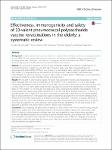Effectiveness, immunogenicity and safety of 23-valent pneumococcal polysaccharide vaccine revaccinations in the elderly: a systematic review
Remschmidt, Cornelius
Harder, Thomas
Wichmann, Ole
Bogdan, Christian
Falkenhorst, Gerhard
Background: In many industrialized countries routine vaccination with the 23-valent pneumococcal polysaccharide vaccine (PPSV-23) is recommended to prevent pneumococcal disease in the elderly. However, vaccine-induced immunity wanes after a few years, and there are controversies around revaccination with PPSV-23. Here, we systematically assessed the effectiveness and safety of PPSV-23 revaccination. Method: We conducted a systematic literature review in MEDLINE, EMBASE, and Cochrane Central Register of Controlled Trials from inception to June 2015. We included all study types that compared effectiveness, immunogenicity and/or safety of PPSV-23 as a primary vs. a revaccination dose in persons aged 50 years and older. With respect to immunogenicity, we calculated the ratio of geometric mean antibody concentrations and opsonophagocytic indexes at identical time-points after primary and revaccination. Additionally, we compared rates and severity of adverse events (AEs) after primary and revaccination. Results: We included 14 observational studies. 10 studies had a prospective design and analysed data on (i) the same individuals after a first and a second dose of PPSV-23 given 1 to 10 years later (n = 5) or (ii) two groups consisting of participants receiving PPSV-23 who were either vaccine-naïve or had received a first PPSV-23 dose 3 to 13 years earlier (n = 5). Three studies used electronic data bases to compare AEs after primary vs. revaccination doses of PPSV-23 after 1 to 10 years and one study had a cross-sectional design. Number of participants in the non-register-based and register-based studies ranged from 29 to 1414 and 360 to 316,000, respectively. 11 out of 14 included studies were at high risk of bias, three studies had an unclear risk of bias. None of the studies reported data on clinical effectiveness. Immunogenicity studies revealed that during the first two months antibody levels tended to be lower after revaccination as compared to primary vaccination. Thereafter, no obvious differences in antibody levels were observed. Compared to primary vaccination, revaccination was associated with an increased risk of local and systemic AEs, which, however, were usually mild and self-limiting. The risk and severity of AEs appeared to decrease with longer intervals between primary and revaccination. Conclusion: Data comparing the effectiveness of primary vs. revaccination with PPSV-23 are still lacking, because there are no studies with clinical endpoints. Data from observational studies indicates that revaccination with PPSV-23 is likely to induce long-term antibody levels that are comparable to those after primary vaccination. Given the high disease burden and the waning of vaccine-induced immunity, revaccination with PPSV-23 could be considered in the elderly. The increased risk of local and systemic AEs can likely be mitigated when giving revaccination at least five years after the primary dose. Adequately powered randomized controlled trials using clinical endpoints are urgently needed.
No license information

